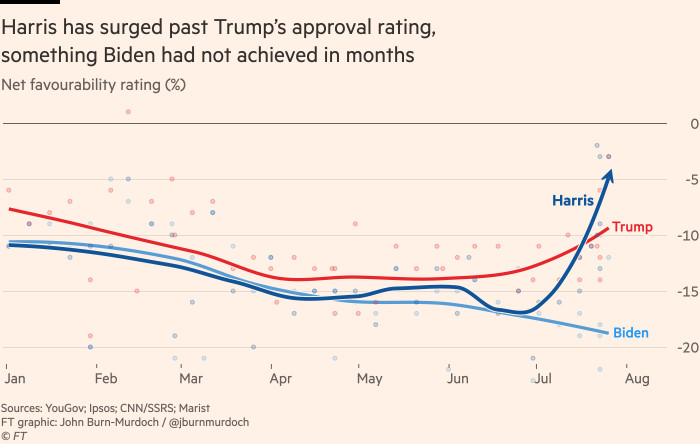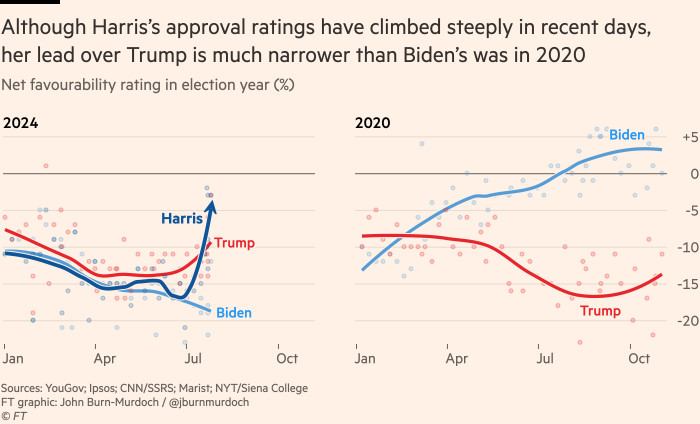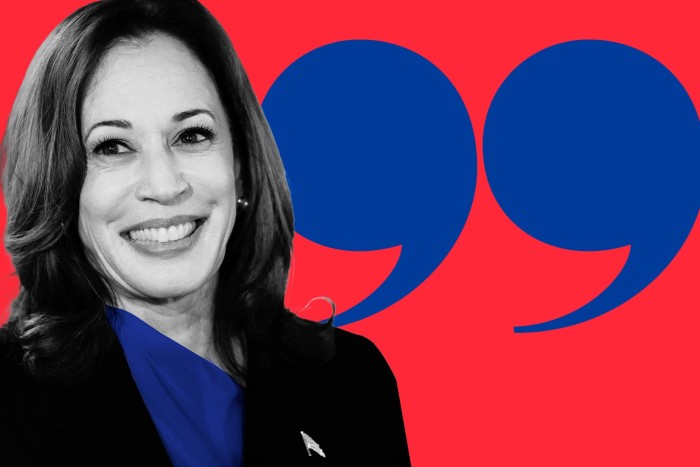
This is an onsite version of the US Election Countdown newsletter. You can read the previous edition here. Sign up for free here to get it on Tuesdays and Thursdays. Email us at [email protected]
Good morning and welcome to US Election Countdown. Today we’re looking at:
Kamala Harris is laying out her economic vision for the US — and hoping voters will be keener for her economic leadership than Joe Biden’s.
Harris will try to avoid association with negative perceptions of the Biden economy and the impact of inflation on voters’ personal finances. She has an opening here, and it could prove easier for her to defend the Biden administration’s policies than the president himself [free to read].
With inflation continuing to fall from the 40-year high it hit in 2022 and the Federal Reserve preparing to lower borrowing costs, Harris has entered the race with an improved set of economic circumstances. If she’s able to harness this momentum, she could also fuel optimism about her plans for future growth.
Biden struggled to convince voters that the economy performed well under his watch, even though he oversaw the country’s exit from the worst economic contraction since the Great Depression and presided over record jobs growth.
While Harris has embraced the most popular parts of Biden’s plans — current and former administration officials say she’s expected to push ahead with investing in the manufacturing sector, bolstering infrastructure and incentivising green energy policies — she’s carving out her own focus area too.
The vice-president will emphasise the so-called care economy, which includes broadening access to childcare and paid family leave, and increasing education funding, all of which Biden couldn’t push through Congress.
But there’s still a huge challenge for Harris: Donald Trump has cast himself as the president for working people. She’ll need to undermine that idea to win over battleground states.
Campaign clips: the latest election headlines
Behind the scenes

JD Vance has had a rough start to his vice-presidential candidacy. There’s growing unease among Republicans over his addition to their ticket after his hardline positions and resurfaced comments gave Democrats fresh attack lines.
Democrats are calling him “weird” and “out of touch”, while Republican strategists warn that the Trump-Vance campaign has to move fast to redefine the Ohio senator.
A clip from 2021, in which Vance warned that the US was being run by “a bunch of childless cat ladies who are miserable at their own lives” and named vice-president Kamala Harris as an example, provoked a national backlash. The presumptive Democratic presidential nominee has two stepchildren.
In other clips, Vance has proposed childless Americans pay higher taxes and that parents should be able to vote on behalf of their children.
One Republican strategist told me that the Trump campaign “got caught flat-footed” by the attacks on Vance:
The longer you wait, the harder it is to get back on offence . . . What was their plan to defend their VP and then promote a much more disciplined message that placed the Democrats in a negative frame?
Republican strategist Doug Heye cited “buyer’s concern” within the party after “the myriad of weird issues in the past week”.
The “abnormal issues” Vance talked about highlighted “an eagerness to go into weird places that will be very easy to allow Democrats to define him”, said Heye. Democrats had been given “an opening” with the “radical, anti-abortion weird stuff that he’s been spewing”.
However, Bryan Lanza, a strategist aligned with the Republican nominee, said that he had not heard from anyone in Trump’s circle that the ex-president regretted his choice.
Datapoint
Democrats have seemingly freed themselves from the impending doom that had engulfed the party for months — and it’s showing up in the data.
Polls published last week show that Harris’s approval rating has surpassed that of Trump, something Biden wasn’t able to do all year.

She’s gotten a bump from previously undecided and independent voters — especially young, Black and Latino voters — that Biden was struggling to reach.
A Wall Street Journal poll released on Friday showed Harris leading Trump by 1 percentage point when third-party candidates were included in the match-up. An ABC/Ipsos survey from Sunday showed that more voters view her favourably than unfavourably, reversing the previous week’s result.
Harris also raised $200mn during the first week of her White House run. Her campaign reported that two-thirds of the haul came from first-time donors.
However, the vice-president conceded over the weekend that Trump was still the favourite to win in November. “We are the underdogs in this race,” she told donors.
Though her approval rating has gone up, her lead over Trump is significantly smaller than Biden’s was in 2020.

Viewpoints
-
Vance is finding that impersonating Trump is not that easy, writes Jemima Kelly.
-
The Fed has a dilemma when it comes to Trump’s potential disruptions, notes Krishna Guha: should it head off prospective shocks, or wait and risk falling behind the curve?
-
Gideon Rachman points out that the real danger to Ukraine from Trump is a neutral Kyiv because Vladimir Putin’s ambitions probably don’t stop there.
-
Trump fancies himself as the king of deregulation, but he overstates his accomplishments on that front, says Ruchir Sharma.
-
On the FT’s Swamp Notes podcast, Lauren Fedor and Edward Luce explain why Harris probably won’t lean into her race or gender on the campaign trail.
FT survey: Why does Kamala Harris appeal to you?

Do you intend to vote for Kamala Harris in the US presidential election? If so, tell us why via a short survey
Recommended newsletters for you
FT Exclusive — Be the first to see exclusive FT scoops, features, analysis and investigations. Sign up here
International morning headlines — Start your day with the latest news stories, from markets to geopolitics. Sign up here